
June 10, 2021 – “We aren’t running out of lawyers in the state, but we
are running out of lawyers in rural areas,” said Minocqua attorney John Danner, chair of a task force that recently made recommendations to address a shortage of lawyers in rural Wisconsin.
Danner, chair of the State Bar of Wisconsin’s Task Force on the Greater Wisconsin Initiative, presented the group’s report and recommendations yesterday to the State Bar of Wisconsin’s Board of Governors, which held its final meeting of the 2021 fiscal year.
It was the seventh consecutive meeting held virtually since the start of the pandemic and officially kicked off the
2021 Annual Meeting & Conference (AMC).
Shortage of Rural Lawyers
Outgoing State Bar President Kathy Brost created the
Greater Wisconsin Initiative in 2019, as president-elect, to address a shortage of lawyers in “Greater Wisconsin,” defined as areas outside Madison, Milwaukee, and the Fox River Valley corridor.
A final report notes that fewer than 40 percent of active lawyers in Wisconsin practice outside urban areas. On average, most of them are over the age of 60 and “current trends indicate that these attorneys are not being replaced” as they retire.
“There is going to be a dire shortage of attorneys in the rural areas, including the one I’m in, and it will reach a crisis,” said Dist. 16 Gov. Lawrence Wiesneske of Rhinelander.
“The State Bar really needs to do something about this.” Wiesneske encouraged people to visit rural communities, local bar meetings, and talk to local lawyers about the area.
The task force noted that the trend will only exacerbate what is already an access to justice problem in the rural counties of the state. The State Bar has engaged in a number of activities to promote rural practice, including a rural bus tour.
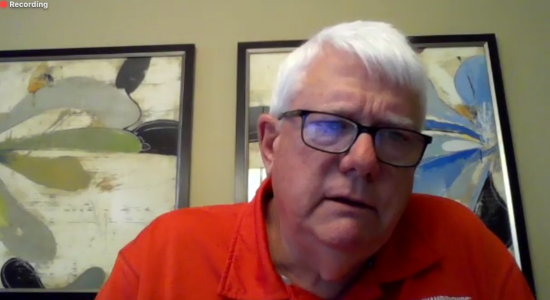
John Danner, Minocqua, is chair of the Task Force on the Greater Wisconsin Initiative, which is exploring ways to address a shortage of attorneys in rural areas.
But the task force says more must be done to draw younger attorneys to the outer parts of the state, noting many intangible reasons for where and why people choose to live and work in particular areas. However, recommendations focused on tangible solutions and dispelled perceptions about income levels in rural parts of the state.
Danner said the task force dove into the issue with a general presumption that compensation played a primary role in the rural attorney shortage.
“We discovered that statistically at least, that is not a correct presumption to make,” Danner said. “Lawyers in rural Wisconsin are very competitive in their average mean income when you take into account the fact that housing costs are less expensive.”
The task force recommended that the State Bar focus its future efforts on both short-term and long-term strategies, including outreach at an earlier stage.
For instance, increased awareness of the State Bar’s High School Mock Trial Program may give students in rural communities, who may choose to return to their home communities as professionals, more exposure to a potential legal career.
Other recommendations highlighted technology to help attorneys expand their reach into rural areas through support for broadband legislation and court rules on videoconferencing, or incentives – such as loan forgiveness – to start practices there.
“This is an issue that is not going away. It will only get worse,” said State Bar President Brost. “But the report includes some very simple steps the State Bar can take.”
Dist. 10 Gov. Starlyn Rose Tourtillott Miller, who lives near Shawano, said rural communities are doing more to attract young professionals, and the State Bar should address how to attract a diverse pool of lawyers to those areas.
State Bar President-elect Margaret Hickey encouraged lawyers in rural communities to be ambassadors and connect with law students and young lawyers to talk about quality of life and how they can have a flourishing practice in those areas of the state.
Incoming President Cheryl Daniels said she will move the Greater Wisconsin Initiative forward when she becomes president on July 1.
Randy Koschnick: State of the Court System
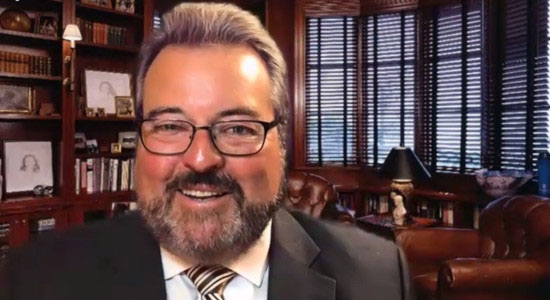
Director of State Courts Randy Koschnick, former circuit court judge in Jefferson County, updated the board about the state of Wisconsin’s court system.
Director Koschnick noted that the court system’s swift transition to Zoom proceedings, at the beginning of the pandemic, allowed the courts to remain operational despite temporary delays and helped limit the backlog of cases on the circuit court dockets.
He said the courts are now transitioning back to in-person proceedings, including jury trials in all 72 counties. Because of the Consolidated Court Automation Program (CCAP), Wisconsin was able to handle a public health crisis better than many states.
“We were better suited than some court systems at the onset of COVID because we had a fully implemented eFiling system already in place for the circuit courts,” said Koscnick, noting the circuit courts are on track to hit normal caseload levels soon.
Board Acts on Diversity, Equity, and Inclusion CLE
The board directed the State Bar’s CLE Committee to draft a petition that would allow lawyers to earn continuing legal education (CLE) credit for programs in diversity, equity, and inclusion (DEI). The board must approve any draft before petitioning the state supreme court.
The Wisconsin Supreme Court sets CLE requirements through SCR Chapter 31. Currently, active lawyers are required to obtain 30 credits every two-year reporting period. Of those 30 credits, three credits must be in the area of ethics and professional responsibility.
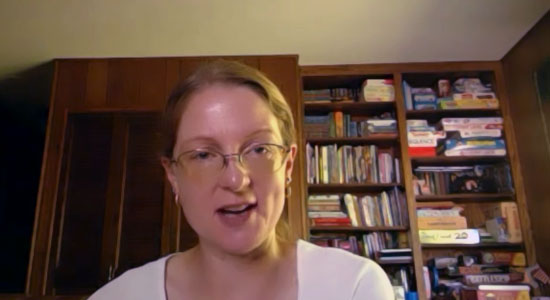
Immidiate past-president Jill Kastner weighs in on a discussion on a potential petition that would allow attorneys to earn CLE credit for diversity, equity, and inclusion programs.
To increase lawyer training in the areas of diversity, inclusion, equity, and implicit bias, the board previously discussed whether to mandate at least two DEI credits.
The board did not vote on the issue of making DEI credits mandatory. Instead, the board voted to pursue a petition that would allow attorneys to obtain voluntary DEI credits, while exploring in greater detail the efficacy of making DEI credits mandatory.
The board directed incoming State Bar President Cheryl Daniels to form a task force that will study, collect data and information, and make recommendations on whether CLE in the area of DEI should be mandatory for State Bar members.
The board will consider a proposal to make DEI credits mandatory at a future meeting, after the task force completes its work. Any proposal to change CLE requirements must be presented to the supreme court as a petition for review.
Board Discusses Anti-discrimination Rule
The board discussed a proposal from the State Bar’s Professional Ethics Committee to adopt ABA Model Rule 8.4(g) into Wisconsin’s attorney ethics rules. The rule states:
"It is professional misconduct for a lawyer to … (g) engage in conduct that the lawyer knows or reasonably should know is harassment or discrimination on the basis of race, sex, religion, national origin, ethnicity, disability, age, sexual orientation, gender identity, marital status or socioeconomic status in conduct related to the practice of law.
This paragraph does not limit the ability of a lawyer to accept, decline or withdraw from a representation in accordance with Rule 1.16. This paragraph does not preclude legitimate advice or advocacy consistent with these Rules."
The proposal would require future adoption by the board before a petition is filed to the Wisconsin Supreme Court. The board only discussed the proposal, which is intended to improve the legal profession’s commitment to diversity, inclusivity, and equal justice.
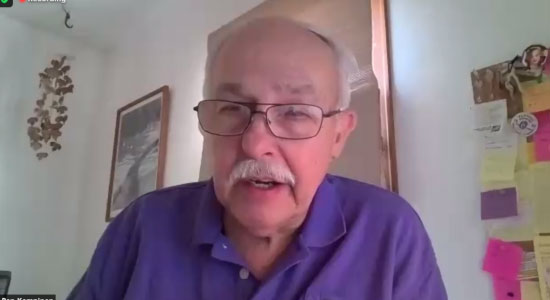
U.W. Law School Professor Emeritus Ben Kempinen discusses a proposal to adopt an ABA Model rule that addresses discrimination. Kempinen is chair of the State Bar's Professional Ethics Committee.
Then State Bar President Jill Kastner, in 2019, tasked all State Bar committees to consider ways in which the State Bar could improve diversity, inclusion, and equity within the profession. The ethics committee’s proposal was a result of that charge.
The model rule would replace SCR 20:8.4(i), which says it is professional misconduct for an attorney to “harass a person on the basis of sex, race, age, creed, religion, color, national origin, disability, sexual preference or marital status in connection with the lawyer's professional activities,” with an exception for “legitimate advocacy.”
The Professional Ethics Committee noted that more than half the states address discrimination and harassment in their ethics rules. Although Wisconsin’s current rules expressly prohibit “harassment,” the change would also prohibit “discrimination” and expand the protected classes to include gender identity and socio-economic status.
A violation would occur only if the lawyer “knows or reasonably should know” their behavior rises to the level of harassment or discrimination. The committee noted that in most cases, discipline derives from intentional and egregious conduct. The current rule, which prohibits harassment, is a strict liability provision that applies regardless of intent.
In addition, the provision would regulate “conduct related to the practice of law,” not just conduct “in connection with the lawyer’s professional activities.”
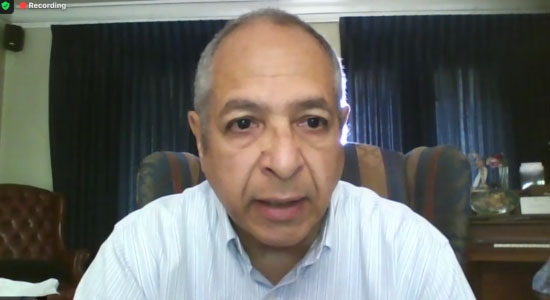
Former Wisconsin Supreme Court Justice Louis Butler Jr., a member of the Professional Ethics Committee, urges the board to support an ABA Model Rule addressing discrimination.
“This approach is not new,” the Professional Ethics Committee explained in a memo. “Lawyers are already subject to discipline for conduct outside of the courtroom, and in some instances, outside of their professional activities.”
While considering the issue, the Professional Ethics Committee solicited comments from State Bar groups, which supported the proposal. The committee also received comments from out-of-state advocacy groups, which registered opposition.
One of the grounds for opposition was a concern that the proposal would violate lawyer’s First Amendment rights by potentially punishing protected speech and/or infringing constitutional freedoms of religion and association.
Retired U.W. Law Professor Ben Kempinen, chair of the Professional Ethics Committee, as well committee member Louis Butler Jr., former justice of the state supreme court, appeared to urge the board’s support for adoption of ABA Model Rule 8.4(g).
“We have found no state or federal court that has found the ABA rule unconstitutional,” Prof. Kempinen said. “I have read and reread carefully the commentary received, and a significant portion of it does not accurately portray the substance of the rule nor the impact it would have or has had in other states that have adopted similar provisions.”
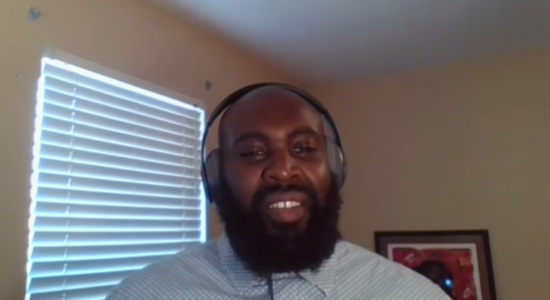
Alex Lodge, the Wisconsin Association of African-American Lawyers Association liaison on the board, weighed in on the discussion regarding CLE for diversity, equity, and inclusion programs.
Kempinen said the proposed rule does not carve out previously unregulated speech or behavior for lawyers, as argued by those in opposition. He said the proposal rule just tweaks and supplements the current rule, which was adopted with little opposition.
Justice Butler said he was on the state supreme court when it passed SCR 20:8.4(i), prohibiting harassment. “In my view, the ABA Model Rule 8.4(g) is a better rule, and certainly worthy of discussion and consideration,” he said.
He said the rule is important in the current social environment, where people appear emboldened to engage in discriminatory behavior.
Board Appointments, Elections, and Consent Agenda
· Upon the recommendation of the board’s Nomination Committee, the board appointed Theresa McDowell to serve as the next chair of the Board of Governors, for fiscal year 2022. McDowell is currently a Nonresident Lawyer Division (NLRD) representative on the board. She is a senior attorney at Garganese, Weiss, D’Agresta & Salzman in Orlando.
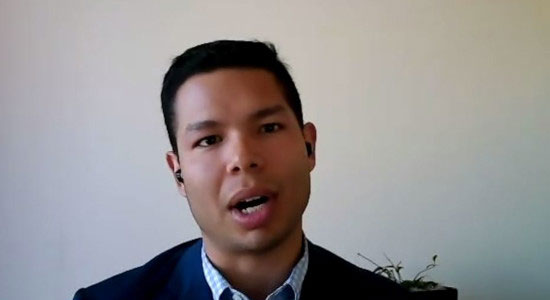
Jose Castro was elected as the State Bar's young lawyer representative on the ABA House of Delegates.
· The board approved four of President Brost’s appointments to the Wisconsin Trust Account Foundation board. CPA
Michelle Knutson and attorneys
Timothy Radelet and
Jerry Vang were reappointed.
Chuck Sterz, outgoing chair of the board, was also appointed to his first term.
· NLRD representative
James Casey, Washington D.C., was elected to another term as the State Bar of Wisconsin Delegate to the ABA House of Delegates.
Jose Castro, Denver, was elected as the State Bar’s young lawyer delegate to the ABA House of Delegates.
· The board elected Dist. 2 Gov.
Amber Raffeet August, Dist. 6 Gov.
John Macy, Dist. 9 Gov.
Jeff Goldman, Dist. 13 Gov.
Robert Barrington, Dist. 11 Gov.
Johanna Kirk, NLRD representative
Kathryn Bullon to the State Bar’s 12-member Executive Committee, which includes the presidents and other leaders.
· The board approved a request from the Appellate Practice Section to amend its section’s bylaws.
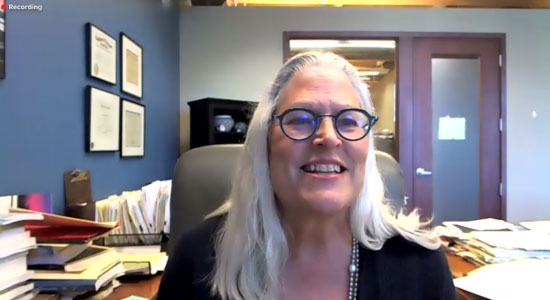
Dist. 2 Gov. Margaret Hickey will start her term as State Bar president-elect on July 1, and will be the fourth consecutive woman elected president when she begins her term in 2022.
· The board approved proposed changes to the Supreme Court rules and State Bar bylaws to include gender-neutral terms, and an emergency clause creating processes in the event of a state or national emergency. By consent, the board also added two seats to what was a five-person Audit Committee.
· By consent, the president-elect, rather than the president, will now appoint the annual Nomination Committee, under a bylaw change the board approved. The Nomination Committee identifies potential candidates for bar leadership roles. In addition, the board approved an electronic registration process for new members.
Upon request, interested members may obtain a copy of the minutes of each meeting of the Board of Governors. For more information, contact State Bar Executive Coordinator Jan Marks by
email or by phone at (608) 250-6106.or by phone at (608) 250-6106.
